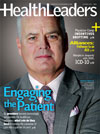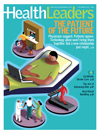
 [Reminder: The place to register an official comment to the government is this page on Regulations.gov. Monday May 7 is the last day.]
[Reminder: The place to register an official comment to the government is this page on Regulations.gov. Monday May 7 is the last day.]
How slowly culture changes.
In September 2009, at the founding of our Society for Participatory Medicine, the cover of Health Leaders magazine said the e-patient was The Patient of the Future. It was a great, in-depth article with subtitles like “Technology connects patients and providers,” and Access to EHRs creates engaged patients.
Their readers may not be such leaders. Two years later (10/09) the cover said “Engaging the Patient,” yet its opening spread Treating Patient as Partner led with this report on readers’ current attitudes:
In our annual Industry Survey, leaders cite patient noncompliance and lack of responsibility as the fifth-greatest driver of healthcare costs at their organizations. … What do healthcare leaders need to do to effectively engage patients and get them to become responsible healthcare partners?
How about giving us information and welcoming our efforts to engage? We know not all patients are actively engaged – look at your reaction when we try.
How ironic that the American Hospital Association now advocates for delaying our access to our records for 30 days – even as they face new penalties if patients’ health fails and they go back in within those same 30 days.
Millenson’s post
SPM members are among the discussion leaders on the AHA’s proposal. Some links and a comment:
- On Wednesday Regina Holliday posted Lives not Livelihoods in Meaningful Use, a powerfully reasoned post and slide show (illustrated, of course) on how health policy must focus on benefitting and enabling the sufferers – the patients – not the vendors who make money whether our family member lives or dies.
- On Friday she posted Rally with Us in Support of Patient Data Access May 6th!, announcing a Washington rally from 2-6pm today outside the annual meeting of the American Hospital Association.
- Yesterday on THCB (The Health Care Blog) Michael Millenson MD posted Will Regina Holliday Become Health Care’s Rosa Parks? He says that while today’s rally “is not quite the same magnitude as agitating for integration in 1950s-era Alabama … there are intriguing similarities between the crusade Rosa Parks launched then and what Holliday is attempting today. Both involve a refusal to accept second-class status and a resolve to push back against entrenched institutions.
Regina illustrated the clarity of her vision and the power of her expression in this exchange with a commenter:
JefferyG says:
All you have to do is get your care at Kaiser – they give patients access to their records.. I think one of Regina’s said that she does in fact belong to Kaiser now?
Shop with your feet instead of asking govt to mandate something if you want real change.
Regina Holliday says:
Dear Jeffery,
Yes, I went to KP after my husband died. If I go to get a check up I have limited data access. Even in KP you do not get doctor’s progress notes or nurses progress notes.
But if I go to the hospital, it would be a KP approved facility not a KP facility. The Meaningful Use Stage One regulations would be my only only legal recourse to get access to my records in a more timely fashion than 21 days.
Meaningful Use Stage One gives us access within 4 days. As we comment on stage 2, many of us are asking for access within 24 hours. If it is in our record we should be able to read it. There are so many ways we could aid in the care model with access to that information.
As far as voting with one’s feet, that is a mighty long walk for most of America. KP has a strong presence on the West Coast, but elsewhere their coverage is sparse.
If I apply Michael’s analogy to your statement it would be, “Why didn’t Rosa Park just move New York where she could sit on any seat in any bus?”
Sometimes we need laws to support us in our attempt to treat our fellow man with dignity and respect wherever they live in our fair country.
Reflecting on other movements
Lately I’ve come to realize an aspect of paternal medicine (regardless of whether it’s well intended) that’s subtle and, I think, perverse: in many domains, we keep patients separate from knowledge, then justify it by noting how ill-informed they are. Isn’t that a bit sick?
And this post makes me think back to the Sixties, when I saw exactly that reasoning applied to blacks. And women, now that I think of it.
How many times did I hear a man say “Don’t you worry your pretty head about that”? Or Todd Rundgren’s offensive 1970 lyric in “We Gotta Get You a Woman”: “They may be stupid but they sure are fun.”
I think Regina hits the nail on the head. The question ought not to be “What are you people complaining about? Aren’t you asking a bit much?” Rather, we should focus on whether people in need are at least being allowed to help themselves – and we really ought to ask if we’re somehow suppressing people, even if we don’t mean to be.
For a deeper dive into this thinking, read Sarah Greene’s post here, three years ago this week: Participatory Medicine as Revolution: Think Critically! Communicate! It cites the book Pedagogy of the Oppressed.






In a related thread on the SPM private member listserv, Joe Ketcherside MD cited his favorite line from Machiavelli’s The Prince”
_________
It must be remembered that there is nothing
more difficult to plan,
more doubtful of success,
nor more dangerous to manage
than the creation of a new system.
For the initiator has
the enmity of all who would profit
by the preservation of the old institution,
and merely lukewarm defenders in those
who would gain by the new one.”
_________
Perhaps people like Rosa – and Regina – decide that the time for “lukewarm defense” has expired.
Amazing quote from HealthLeaders!
To the question “What do healthcare leaders need to do to effectively engage patients and get them to become responsible healthcare partners?” a simple answer applies:
“Provide us with our data and get out of the way! If it comes from within us, it’s ours.”
Healthcare leaders are not in the business of providing the right content for a patient or deciding what an end-user(me) should have access to. They can not even provide the right content for the clinicians! So, what they should do is to just allow us, the end user, to gain access to the data we need to make informed decisions. Really simple.
One interesting snippet fo information: Who is on the Board of Trustees of the AHA?
http://www.aha.org/about/org/board.shtml
The Chairman elect is …..
Benjamin K. Chu, M.D.
President, Kaiser Permanente Southern California Region
Group President, Kaiser Permanente Southern California and Hawaii
393 E. Walnut Street
Pasadena, CA 91188
Phone: 626/405-6500
Fax: 626/405-2583
So, we have to understand that KP is supporting this brain-dead AHA request!
Does this mean that Hugo Campos or his counterparts must always have any of their surprise problems close enough to have the “interrogator” pop into the ER at the same time he is there? And think how unhappy we are when the cable goes out, and the cable man is a few hours late in coming? What am I missing here?
Growing up in a rural area, hours from any big population center and now likely to be stuck on some freeway while heading to the ER most convenient for an “interrogator”, I just don’t understand how this system can work at the very times it needs to work.